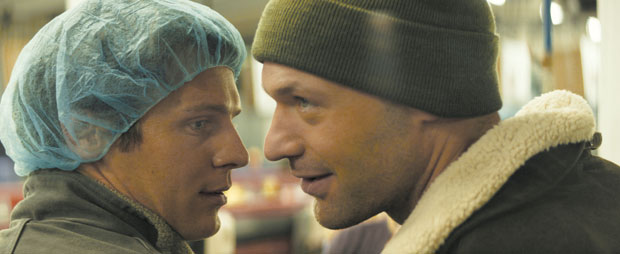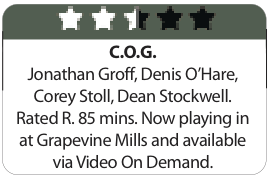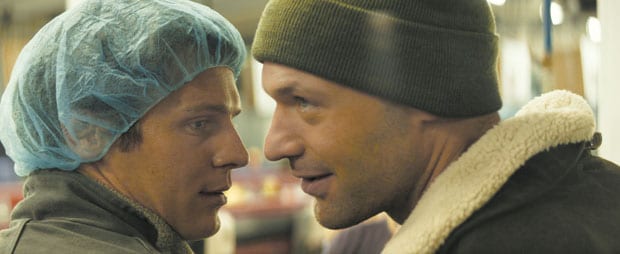David Sedaris is finally adapted to film, but was it worth the wait?

C.O.G. GENT | A privileged East Coast intellectual (Johnathan Groff) gets lessons in life from the denizens of a rural community, including his creepy co-worker (Corey Stoll) in ‘C.O.G.’
ARNOLD WAYNE JONES | Life+Style Editor
 David Sedaris is one of the funniest, and most popular, essayists of the last two decades, so it’s always been strange that his work has rarely been adapted to other media: A stage version is his novelette The Santaland Diaries (of which he disapproved), and a handful of plays co-written with his sister Amy, and that’s about it. To enjoy his work, you need to read it (or better yet, see him read it live, which you can do at Bass Hall in November).
David Sedaris is one of the funniest, and most popular, essayists of the last two decades, so it’s always been strange that his work has rarely been adapted to other media: A stage version is his novelette The Santaland Diaries (of which he disapproved), and a handful of plays co-written with his sister Amy, and that’s about it. To enjoy his work, you need to read it (or better yet, see him read it live, which you can do at Bass Hall in November).
So for Sedaris fans, the release of C.O.G. is a reason to celebrate: The first-ever film adaptation of one of his stories. (It played at the Dallas International Film Festival earlier this year.)
Is it among his best — or even representative of Sedaris’ bitter, snide style? Not really. But there is much to enjoy in this picaresque about David (Jonathan Groff, of Glee and Spring Awakening), an over-privileged millennial. In an act of defiance from his Connecticut parents and Ivy League education, and in a mistaken romantic gesture, he sets out on a bus to Oregon, changes his name to Samuel and gets a job as the only Anglo picking fruit in an orchard: It’s The Cider House Rules meets The Grapes of Wrath meets Catcher in the Rye.
David meets a coterie of strange personalities — the orchard’s brittle owner (Dean Stockwell, looking ghostly and frail), a crabby sorter at the apple factory (Dale Dickey), a creepy forklift operator (Corey Stoll), a street preacher (Denis O’Hare, of True Blood and American Horror Story) — all of whom seem more foreign to him. But really, he’s the outsider.
It’s not an unfamiliar structure — from Northern Exposure to Martin Scorsese’s After Hours — and while the setting is unique, not much else is. Director/writer Kyle Patrick Alvarez veers toward sentimentality and melodrama when more laughs would work better. And the religious conversion theme feels false if not an outright betrayal of Sedaris’ snarkiness.
Still, there are some droll throwaways: David trying to feed cows a piece of roast beef (unaware of the cannibalistic implications); silencing a noisy Jesus-freak with an atheist rant; encountering a co-worker’s collection of dildos.
Groff is a placid presence, reacted on more than reactive, and O’Hare and Stoll get the showier parts, but the performance style overall is as subdued and low-key as the murky pallette of the Pacific Northwest.
C.O.G. isn’t the Sedaris movie devotees have been waiting for. But it is something, and entertaining as far as it goes. That’s a start.
This article appeared in the Dallas Voice print edition September 20, 2013.

